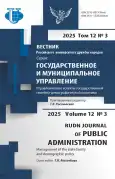Natural reproduction of the population and the influence of spiritual and moral education and traditional values: an interdisciplinary analysis
- Authors: Korolev M.A.1
-
Affiliations:
- Russian University of Medicine, Ministry of Health of the Russian Federation
- Issue: Vol 12, No 3 (2025): MANAGEMENT OF THE STATE FAMILY AND DEMOGRAPHIC POLICY
- Pages: 350-358
- Section: MANAGEMENT OF THE STATE FAMILY AND DEMOGRAPHIC POLICY
- URL: https://bakhtiniada.ru/2312-8313/article/view/349659
- DOI: https://doi.org/10.22363/2312-8313-2025-12-3-350-358
- EDN: https://elibrary.ru/BUEILP
- ID: 349659
Cite item
Abstract
This study is devoted to a comprehensive analysis of the role of spiritual and moral education in the formation of reproductive attitudes of the individual and its impact on modern demographic processes. In the context of the axiological crisis that characterizes many modern societies and the accompanying transformation of traditional socio-cultural models, the study of factors influencing reproductive behavior is becoming particularly relevant. The author considers the mechanisms of interrelation and mutual influence of the individual’s value orientations, historically established family traditions and patterns of reproductive behavior. The study analyzes the current challenges caused by the erosion of spiritual foundations and moral imperatives that have a direct impact on the institution of the family and reproductive strategies of the population. An attempt is made to comprehend the role of spiritual and moral education and traditional values in the context of ensuring sustainable natural reproduction of the population. This phenomenon is considered through the prism of its influence on the formation and translation of social norms governing marriage and family relations, as well as on the formation of individual reproductive attitudes and, as a result, on specific manifestations of demographic behavior. The study examines how the assimilation of moral and ethical principles and commitment to cultural and historical heritage contribute to the formation of a responsible attitude towards starting a family, giving birth and raising children, countering the trends of depopulation and population aging. The author analyzed the potential of educational and cultural institutions in strengthening the spiritual and moral foundations of society as a factor of demographic security and sustainable development. The development and implementation of modules in educational programs are considered as specific measures.
About the authors
Maxim A. Korolev
Russian University of Medicine, Ministry of Health of the Russian Federation
Author for correspondence.
Email: m.korolev10@mail.ru
ORCID iD: 0000-0002-1107-4588
SPIN-code: 7984-0660
Candidate of Sociological Sciences, Associate Professor at the Department of Social Medicine and Social Work
4 Dolgorukovskaya st., Moscow, 125993, Russian FederationReferences
- Eliseeva AA. Family and family values: approaches to understanding in the context of modern law. Actual Problems of Russian Law. 2022;17(3):67–74. (In Russ.). https://doi.org/10.17803/1994-1471.2022.136.3.067-074 EDN: BYVQPI
- Tarasova EO. Positive and negative aspects of living in multi-generational families. Vestnik Permskogo natsional’nogo issledovatel’skogo politekhnicheskogo universiteta. Sotsial’no-ehkonomicheskie nauki. 2020;(1):64–75. (In Russ.). https://doi.org/10.15593/2224-9354/2020.1.5 EDN: NGENCZ
- Minkov M, Sokolov B, Lomakin I. Evolution of the Hofstede model of cultural dimensions: parallels between objective and subjective culture. Russian Sociological Review. 2023;22(3):287–317. (In Russ.). https://doi.org/10.17323/1728-192x-2023-3-287-317 EDN: OKFJGC
- Shemshurina AI. The axiological approach as the basis for a system of moral education for children and young people. Nizhegorodskoe obrazovanie. 2011;(4)32–38. (In Russ.). EDN: ONHZQJ
- Chuprina AA. Spiritual and moral attitudes of the individual as normative principles of marriage and family relations. Vestnik Stavropol’skogo gosudarstvennogo universiteta. 2012;(1):103–107. (In Russ.). EDN: PAETER
- Semenova I. Spiritual moral education of children and the youth as state family policy in crisis conditions. Oeconomia et Jus. 2017;(2):59–64. (In Russ.). EDN: YSQWXL
- Lesthaeghe R. The second demographic transition, 1986–2020: sub-replacement fertility and rising cohabitation — a global update. Genus. 2020;76(1):10. https://doi.org/10.1186/s41118-020-00077-4 EDN: DKYYGB
- Rostovskaya TK, Kuchmaeva OV, Vasileva EN. Large family in the modern Russian society: demographic aspect. Management Issues. 2024;(3):9–23. (In Russ.). https://doi.org/10.22394/2304-3369-2024-3-9-23 EDN: JZPLJE
- Sokuler ZA. 2002.01.002. Burd’e P. 2002.01.002. Bourdieu P. The Hegemony of Men. Bourdieu P. La domination masculine. Paris: seuil, 1998. 145 P. Social Sciences and Humanities. Domestic and Foreign Literature. Series 11: Sociology. 2002;(1):9–24. (In Russ.). EDN: BBVSMV
- Rostovskaya TK, Egorychev AM, Shapovalova IA. The role of the Russian Orthodox Church in the formation family policy of the Russian Federation. Sotsial’naya politika i sotsiologiya. 2021:20(3):191–199. (In Russ.). https://doi.org/10.17922/2071-3665-2021-20-3-191-199 EDN: MQTSYL
- Prutskova EV, Pavlyutkin IV, Borisova ON. Religiosity and fertility in Russia and other European countries: the effect of social context. Monitoring of Public Opinion: Economic and Social Changes. 2023;(2):103–126. (In Russ.). https://doi.org/10.14515/monitoring.2023.2.2359 EDN: BGRMSQ
- Dantis Ch, Rizzi EL, Baudin T. The association between religiosity and fertility intentions via grandparenting: Evidence from GGS data. European Journal of Population. 2023;39(1):1. https://doi.org/10.1007/s10680-023-09652-9 EDN: QTRRTD
- Manapova AB. R. Inglehart’s lifestyle and postmaterialist value theory. Innovatsii. Nauka. Obrazovanie. 2021;(32):2167–2170. (In Russ.). EDN: MFCPND
- Divnogortseva SYu. Spiritual and moral education of pupils in modern Russia: the experience of interaction of families, schools and the Russian Orthodox Church. Vestnik Moskovskogo universiteta MVD Rossii. 2010;(11):7–11. (In Russ.). EDN: NTOASP
Supplementary files










